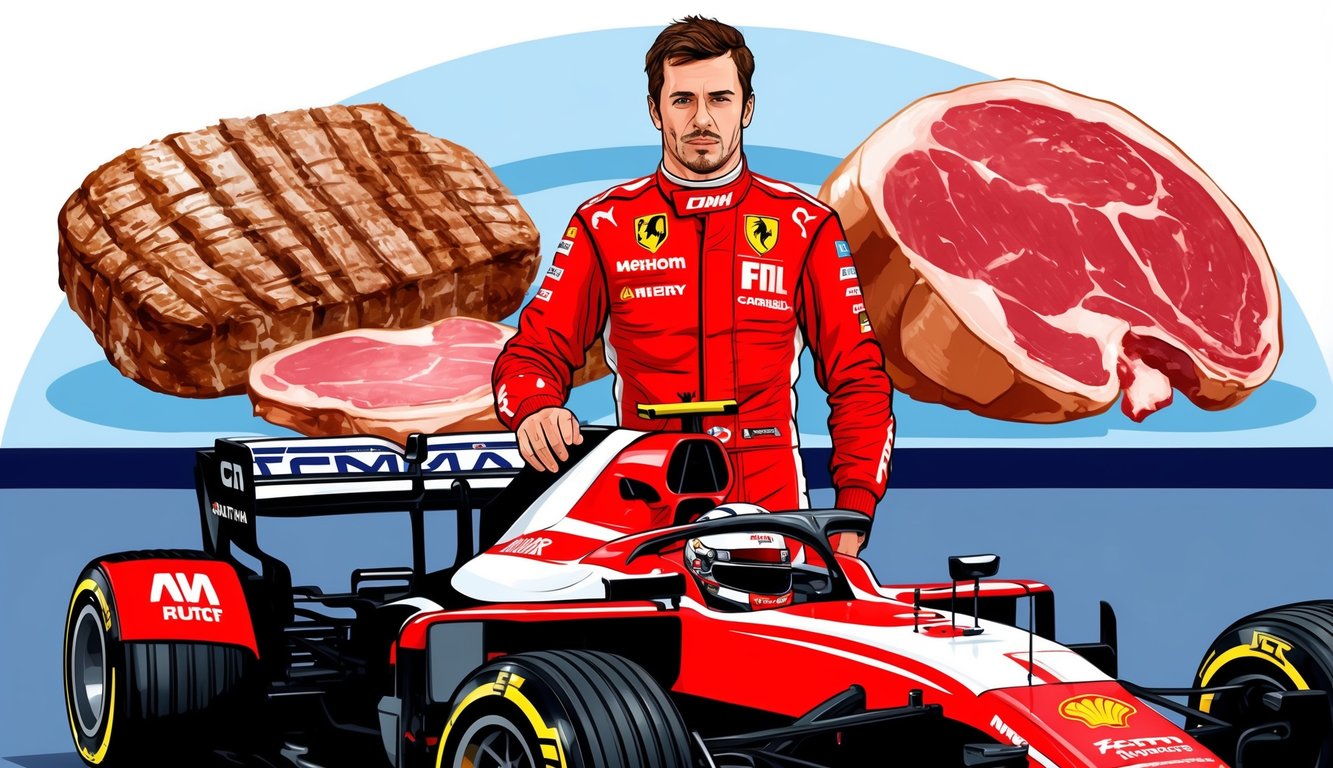Formula 1 drivers push their bodies to the absolute limit during races, requiring peak physical fitness and optimal nutrition. Recently, some drivers have explored unconventional dietary approaches like the carnivore diet to gain a competitive edge. This controversial eating plan consists solely of animal products, eliminating all plant-based foods.
The carnivore diet may offer F1 drivers sustained energy levels, reduced inflammation, and enhanced cognitive function due to its high protein and fat content. Proponents argue these benefits could translate to improved focus and endurance during long, grueling races. However, this approach starkly contrasts with traditional dietary recommendations for athletes, which typically include a balance of carbohydrates, proteins, and fats.
While some drivers have reported positive results from the carnivore diet, it remains a subject of debate among nutrition experts and sports scientists. Critics warn about potential long-term health risks and nutrient deficiencies associated with such a restrictive eating plan. As with any extreme dietary change, F1 drivers considering the carnivore diet should consult with medical professionals and closely monitor their performance and health markers.
The Role of Nutrition in Formula 1 Racing
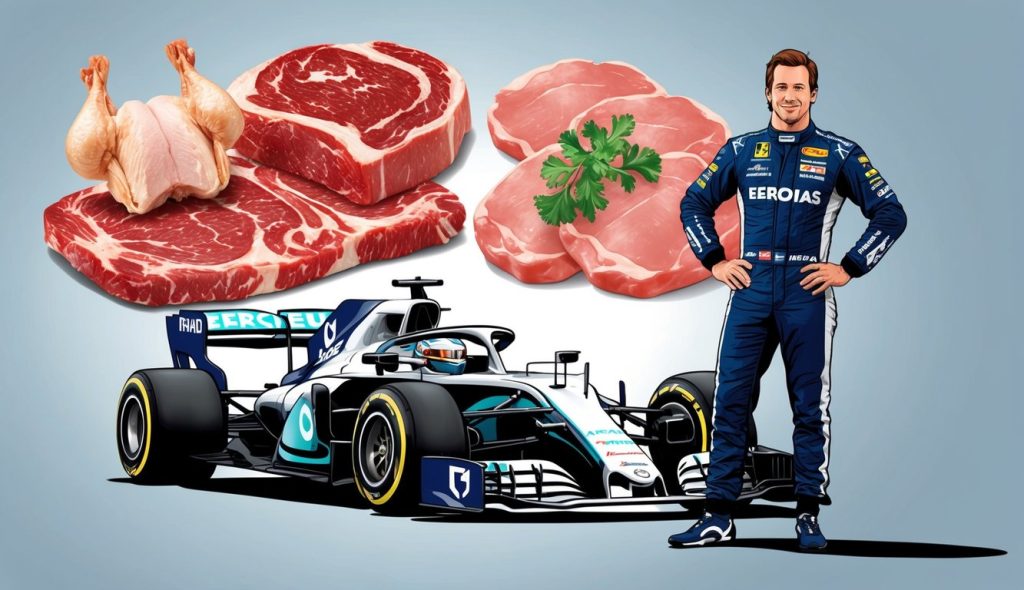
Nutrition plays a crucial role in Formula 1 racing, directly impacting driver performance and endurance. F1 drivers are high-performance athletes who face intense physical and mental demands during race weekends.
A well-balanced diet helps drivers maintain optimal weight, stay focused, and recover quickly. Most F1 drivers aim for specific macronutrient ratios: 1.5-2.0 grams of protein per kilogram of body weight, 1.0-1.5 g/kg of fat, and 3-7 g/kg of carbohydrates daily.
During a Grand Prix, drivers can burn up to 1,500 calories and lose 2-4kg of fluid. This extreme physical exertion requires careful nutritional planning to maintain peak performance.
Hydration is equally important. Drivers often experience significant weight loss during races due to fluid loss. Proper hydration strategies are essential to combat fatigue and maintain mental acuity.
Formula 1 teams employ nutritionists to create personalized meal plans for each driver. These plans take into account individual metabolic needs, race conditions, and weight management goals.
Key nutrients for F1 drivers include:
- Complex carbohydrates for sustained energy
- Lean proteins for muscle recovery
- Healthy fats for hormone balance
- Electrolytes for hydration
By optimizing their nutrition, F1 drivers can enhance their physical performance, mental focus, and overall success on the track.
Essential Nutrients for High-Speed Performance
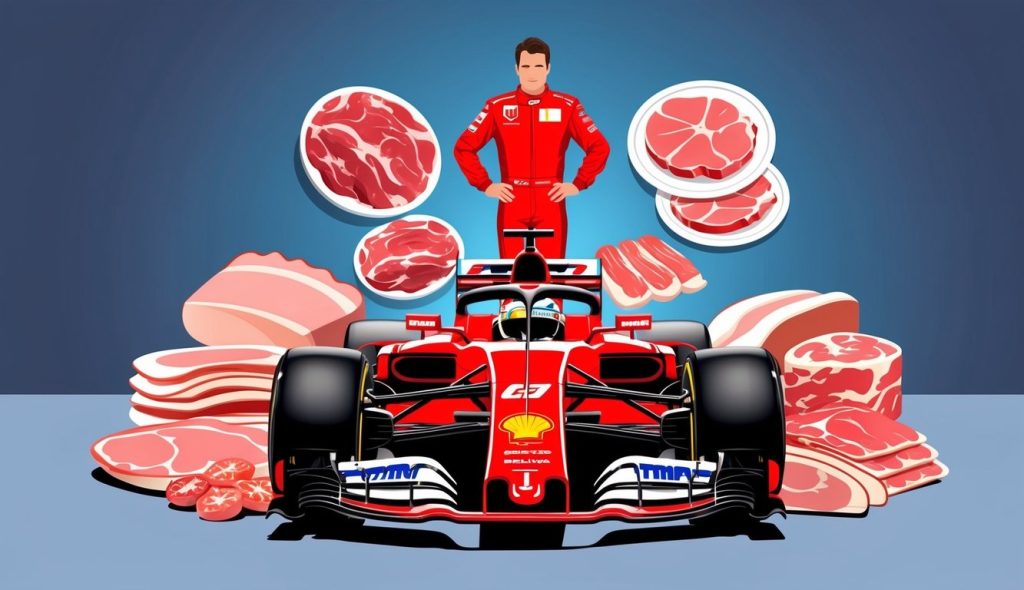
Formula 1 drivers require specific nutrients to maintain peak performance during high-speed races. These nutrients support energy, focus, and physical endurance in the demanding environment of professional racing.
Macronutrients and Their Impact
Protein plays a crucial role in maintaining muscle mass and strength for Formula 1 drivers. A diet rich in high-quality animal proteins supports muscle repair and recovery. Fat is equally important, providing sustained energy during long races. Drivers often consume healthy fats from sources like grass-fed beef and fatty fish.
Carbohydrate intake is carefully managed to maintain stable blood glucose levels. Low-glycemic carbs are preferred to avoid energy spikes and crashes. Some drivers follow a modified carnivore approach, incorporating small amounts of easily digestible carbs for quick energy release.
Calorie intake is tailored to each driver’s needs, considering factors like body weight, race duration, and climate conditions.
Micronutrients, Vitamins, and Minerals
Electrolytes are vital for Formula 1 drivers to maintain proper hydration and muscle function. Sodium, potassium, and magnesium are especially important in hot race conditions. These can be obtained from animal-based foods and supplements.
B-vitamins, particularly B12, support energy metabolism and cognitive function. Iron is crucial for oxygen transport, enhancing endurance. Zinc aids in muscle repair and immune function.
Omega-3 fatty acids from fatty fish or supplements can improve focus and reduce inflammation. Vitamin D, often from sun exposure or supplements, supports bone health and immune function.
Drivers may also benefit from creatine for short bursts of energy and beta-alanine for improved endurance. Adequate vitamin C intake supports the immune system during high-stress race weekends.
Strategic Eating for Peak Physical Condition

Formula 1 drivers require carefully planned nutrition to maintain peak physical condition. Proper timing of meals and strategic pre-race and post-race nutrition are crucial for optimal performance on the track.
Timing of Meals and Snacks
F1 drivers follow strict meal schedules to fuel their bodies effectively. They typically consume 5-6 smaller meals throughout the day, spaced 2-3 hours apart. This approach helps maintain stable blood sugar levels and provides a consistent energy supply.
Breakfast is often the largest meal, consumed 3-4 hours before training or racing. It usually includes complex carbohydrates, lean proteins, and healthy fats. Lunch and dinner are balanced meals with emphasis on protein for muscle recovery.
Snacks are strategically timed between meals and around training sessions. These often consist of easily digestible carbohydrates and proteins to maintain energy levels and support muscle function.
Pre-Race and Post-Race Nutrition
Pre-race nutrition focuses on topping up energy stores without causing digestive discomfort. Drivers typically consume a carbohydrate-rich meal 3-4 hours before the race, followed by a light snack 1-2 hours prior.
Hydration is crucial, with drivers sipping on electrolyte-rich fluids in the hours leading up to the race. During the race, they may consume small amounts of energy gels or drinks if needed.
Post-race nutrition prioritizes rapid recovery. Drivers consume a combination of fast-acting carbohydrates and proteins within 30 minutes of finishing to replenish glycogen stores and support muscle repair. This is followed by a balanced meal within 2 hours to further aid recovery and prepare for upcoming training sessions.
Optimized Food Sources for F1 Drivers
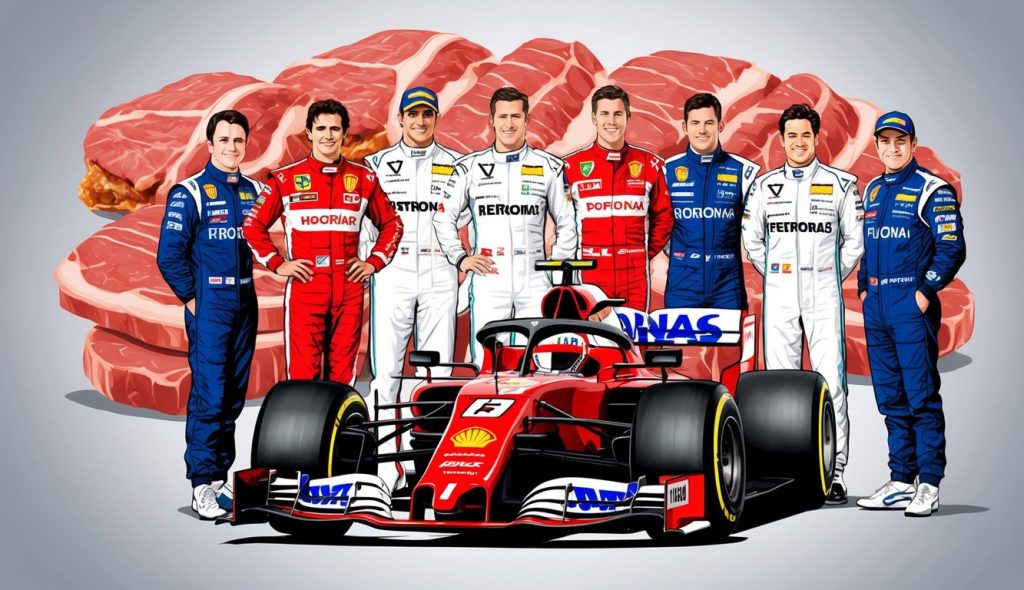
Formula 1 drivers require carefully selected foods to fuel their performance on the track. Proper nutrition supports muscle development, provides sustained energy, and promotes overall well-being.
Protein-Rich Foods for Muscle Development
F1 drivers prioritize high-quality protein sources to maintain and build muscle mass. Lean meats like chicken and turkey breast offer essential amino acids. Fish, particularly salmon and tuna, provide protein along with beneficial omega-3 fatty acids.
Eggs are a versatile protein source, easily incorporated into meals. Greek yogurt serves as both a protein-rich snack and a base for nutritious smoothies. For vegetarian or vegan drivers, quinoa offers a complete protein profile.
Protein shakes made with whey or plant-based protein powders are popular among drivers for quick post-workout recovery. These convenient options help meet increased protein needs during intense training periods.
Carbohydrates for Energy and Focus
Complex carbohydrates play a crucial role in providing sustained energy for F1 drivers. Brown rice and quinoa are excellent choices, offering slow-releasing energy and important nutrients.
Oats, often consumed as porridge with berries, provide a filling breakfast that maintains blood sugar levels. Whole grain pasta and bread are incorporated in pre-race meals to ensure adequate glycogen stores.
Fruits and vegetables supply carbohydrates along with essential vitamins and minerals. Berries are particularly favored for their antioxidant properties. Bananas offer easily digestible carbs and potassium, supporting hydration.
Healthy Fats for Overall Well-Being
F1 drivers include healthy fats in their diets to support hormone production and reduce inflammation. Avocados are a popular choice, providing monounsaturated fats and fiber.
Nuts and seeds, such as almonds and chia seeds, offer a mix of healthy fats, protein, and micronutrients. Olive oil is used in cooking and dressings, supplying anti-inflammatory compounds.
Fatty fish like salmon and mackerel are consumed regularly for their omega-3 content. These fats support brain function and may help with recovery from the physical demands of racing.
Customized Diet Plans for Formula 1 Drivers
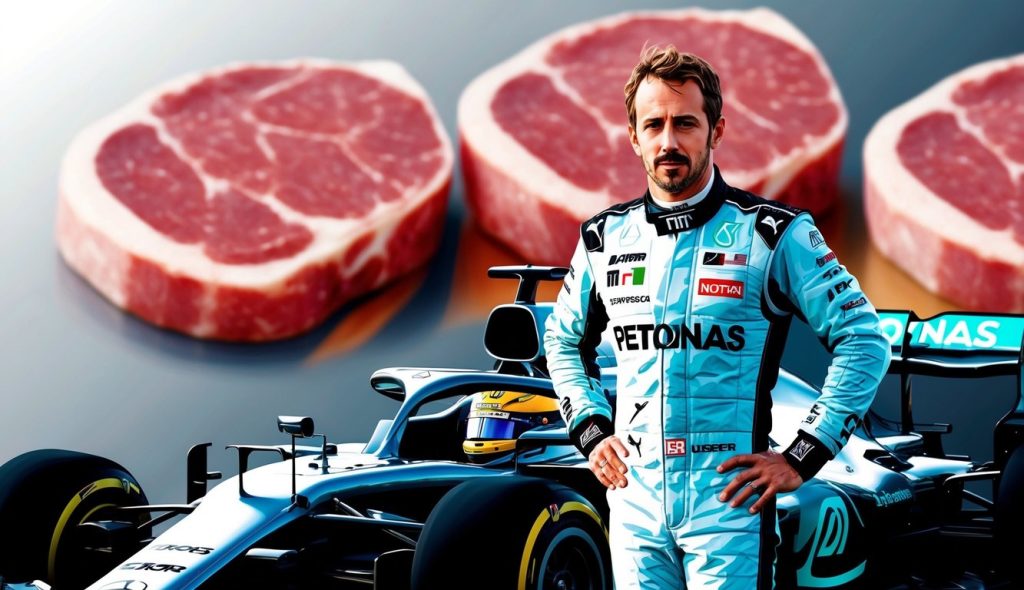
Formula 1 drivers require carefully tailored nutrition to optimize performance. Their diets focus on precise macronutrient ratios, timing of meals, and adapting to unique race day demands.
Individual Dietary Requirements
F1 drivers follow strict dietary regimes customized to their specific needs. Protein intake is crucial, with many consuming scrambled eggs and lean meats to support muscle recovery. Carbohydrates are timed strategically to fuel high-intensity efforts during qualifying laps and races.
Some drivers opt for higher fat intake to promote mental acuity and sustained energy. Others emphasize complex carbs for quick bursts of power. Hydration plans are meticulously calculated, often including electrolyte-rich drinks.
Supplements may be used to fill nutritional gaps, but whole foods are prioritized. Meal timing is coordinated with training sessions and race schedules to optimize nutrient absorption and energy levels.
Adapting to Travel and Diverse Locations
F1’s global schedule presents unique dietary challenges. Drivers must maintain consistent nutrition while constantly changing time zones and cuisines.
Teams often travel with personal chefs to ensure dietary consistency. Meals are prepared using familiar ingredients sourced locally when possible. Drivers may pack portable snacks and supplements to fill gaps when ideal options aren’t available.
Hydration strategies are adjusted for different climates, with increased fluid and electrolyte intake in hot locations. Food safety is paramount, so trusted sources are used to avoid illness that could impact race performance.
Sleep schedules and meal timing are carefully managed to minimize jet lag‘s effects on appetite and digestion. Flexibility is key, as drivers balance nutritional needs with occasional local cuisine to maintain morale during long seasons.
Supplements and Hydration Strategies
Formula 1 drivers following a carnivore diet must pay special attention to supplementation and hydration to optimize performance and health. Carefully selected supplements and targeted hydration strategies are crucial for maintaining peak physical condition in this demanding sport.
Enhancing Performance with Supplements
Electrolyte supplements are essential for carnivore diet followers, especially in the high-intensity world of Formula 1 racing. Sodium, potassium, and magnesium play critical roles in muscle function and hydration. Magnesium supplements support bone health and muscular performance, crucial for withstanding G-forces during races.
Vitamin D and omega-3 fatty acids may be beneficial, as these nutrients are typically lower in an all-meat diet. Some drivers opt for beef liver supplements to boost their micronutrient intake, particularly for vitamin A and B-complex vitamins.
Creatine can aid in power output and recovery, potentially giving drivers an edge during intense race weekends.
Maintaining Fluid Balance
Proper hydration is paramount for Formula 1 drivers on a carnivore diet. The diet’s higher protein content can increase the body’s water requirements. Drivers must monitor urine color as an indicator of hydration status, aiming for a pale yellow color.
Electrolyte-enhanced water or specially formulated sports drinks help replace minerals lost through sweat during races and training. Some drivers incorporate bone broth into their hydration strategy, benefiting from its mineral content and amino acids.
Chamomile tea, while not a traditional hydration source, can be used post-race to promote relaxation and aid in recovery without compromising the carnivore diet principles.
Drivers should establish a consistent hydration schedule, drinking at regular intervals rather than waiting until thirst sets in, to prevent performance-hindering dehydration.
Physical Conditioning and Nutritional Synergy
Formula 1 drivers require a finely tuned balance between their diet and physical training. Proper nutrition fuels intense workouts, while targeted exercises prepare the body for racing demands.
The Interplay Between Diet and Training
A carnivore diet provides high-quality protein and fats essential for muscle recovery and energy. F1 drivers combine this nutritional approach with specialized workouts to optimize performance. Protein intake supports muscle repair after intense training sessions. Fat consumption aids in hormone production and energy regulation during long races.
Drivers tailor their macronutrient ratios to match their training phases. Higher protein intake supports muscle building, while increased fat consumption enhances endurance. Carbohydrate intake is carefully monitored to maintain optimal body weight without sacrificing energy levels.
Hydration strategies are crucial. Drivers may lose 2-4kg of fluid during a race, necessitating precise fluid and electrolyte replacement protocols.
Building Core and Neck Strength
F1 drivers face extreme g-forces, requiring exceptional core and neck strength. Targeted exercises focus on these critical areas to withstand racing demands.
Core workouts include planks, rotational exercises, and stability ball training. These movements enhance overall stability and posture control in the cockpit.
Neck strengthening exercises utilize resistance bands and specialized equipment. Isometric holds and controlled movements mimic the forces experienced during cornering and braking.
Drivers integrate these exercises into comprehensive training programs. Regular assessment ensures progress and identifies areas for improvement. Strength gains directly translate to improved race performance and reduced fatigue.
Regulatory Considerations and Diet

Formula 1 drivers must carefully balance their dietary choices with regulatory requirements. The sport’s governing body imposes strict rules that impact nutrition strategies.
Meeting the FIA’s Minimum Weight Requirements
F1 drivers face a challenge in maintaining a specific weight to meet FIA regulations. The combined weight of driver and car must exceed a minimum threshold. This rule influences dietary decisions, as drivers aim to stay lean without compromising performance.
Heavier drivers may need to restrict calorie intake, potentially limiting their carnivore diet options. Lighter drivers have more flexibility, allowing for increased meat consumption. Teams often work with nutritionists to optimize driver weight through precise meal planning.
Protein-rich foods like lean meats are crucial for muscle maintenance. Drivers must balance protein intake with overall calorie control to meet weight requirements.
Substance Testing and Compliance
F1 enforces rigorous anti-doping policies. Drivers following a carnivore diet must ensure their food choices don’t lead to failed drug tests. Certain meats or supplements could contain banned substances.
Key considerations:
- Avoiding contaminated meat sources
- Careful selection of dietary supplements
- Regular testing to verify compliance
Teams employ experts to vet all food and supplements. This scrutiny extends to carnivore diet staples like organ meats and bone broths. Drivers must maintain detailed food logs to track potential risks.
Hydration strategies on a carnivore diet also require careful monitoring. Electrolyte balance is critical for performance and meeting substance testing requirements.
